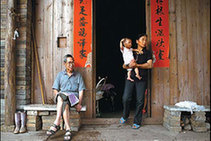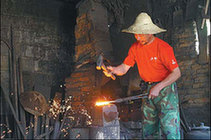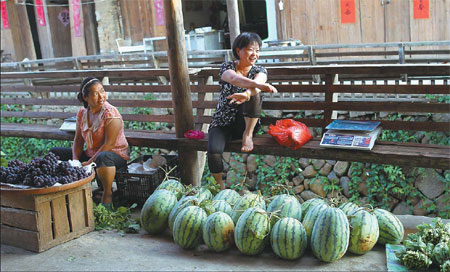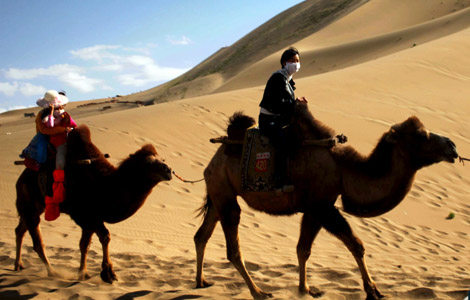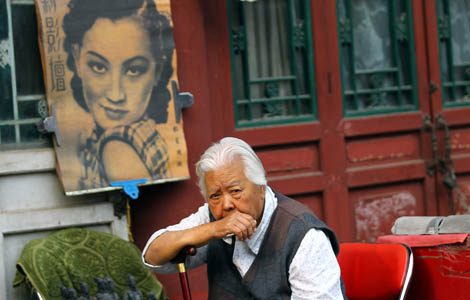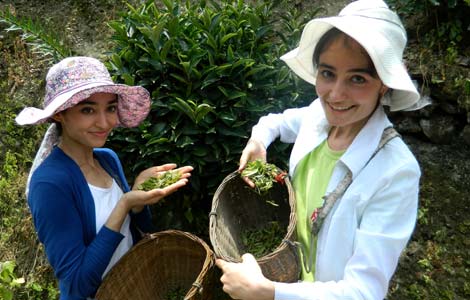Sidestepping the rush of modern life
Updated: 2013-09-05 07:43
By He Na and Hu Meidong (China Daily)
|
||||||||
Xiamei village has a rich past, but now it's fading into history, He Na and Hu Meidong report from Wuyi Mountain, Fujian province.
Wearing light blue clothes with small black flowers, her white and gray hair wrapped up in a bun, Zhu Ezai sits on a bamboo chair and stares at a small pile of Dahongpao tea on the table in front of her.
With quick, repeated movements, the 80-year-old busily picks out bad tea stalks, dust and yellow leaves. The room where Zhu works is in a two-story house built during the Ming Dynasty (1368-1644). Its gray walls are discolored by damp and are crumbling with age.
Zhu lives in Xiamei, a village at the foot of Wuyi Mountain Tourist Resort in Fujian province. Although it's only 8 kilometers from a well-known resort, the village has remained a secret and almost untouched by the modern world.
Several years ago, a daily shuttle bus operated between Wuyishan and Xiamei, but a dearth of regular passengers forced the closure of the service. Even taxi drivers are reluctant to take people out to the village because they have to return empty.
|
Liu Qishu, 63, and his wife have been living in Xiamei for 40 years. |
The villagers are used to being ignored and they enjoy their quiet lives. Visitors see Xiamei as a rural refuge from the bustling cities of present-day China.
One's first impression of Xiamei is that it feels like an old water town, such as Zhouzhuang or Xitang in the Yangtze River Delta. A shallow river, the Meixi, flows through the village. Covered open-sided wooden walkways line the riverbanks and the town boasts pavilions, small stone bridges, archways and ancestral halls.
A rich history
Xiamei was a center of the tea trade during the Qing Dynasty (1644-1911) and, according to Zhu, the long bench - known locally as a "Bench of Beauty" - in one of the walkways was where wives sat and waited for their husbands to return after a day conducting business along the river.
The Meixi is only a half-meter deep now, but during the Qing Dynasty it had enough water to allow tea to be transported in small boats and on bamboo rafts. Xiamei was the first trading port to give merchants from landlocked Shanxi province the opportunity to export Wuyi rock tea. The village and its inhabitants grew rich on the trade.
|
Yin Yantong, 52, is the only blacksmith in the Wuyishan area. He has been plying his trade for more than three decades. |
The village has a history of more than 3,000 years and there are still more than 70 well-preserved buildings dating from the Ming and Qing dynasties.
The prosperous tea trade led to a population boom and the village expanded along both sides of the river, with many of the new houses doubling as storerooms.
However, the good times didn't last. The village's key role in river transport was replaced by five ports that the Qing Dynasty was forced to open to foreign traders in the wake of the first Opium War (1839-42).
There's very little business activity in Xiamei nowadays, just a few small grocery stores, some snack bars, a barbershop and a teahouse serve the 2,700 villagers.
Several old handicraft shops that have survived for more than a century are still open, but business declines year by year.
Yin Yantong, 52, is the only blacksmith in the Wuyishan area. Yin's handmade knives and farming implements are stronger and more durable than machine-made tools, a factor that provides a slim hope of survival in a highly industrialized world.
The shop's sign indicates two blacksmiths, but Yin has worked alone since poor health forced his wife to quit the trade last year.
It takes Yin six hours to make a kitchen knife. He doesn't know how many times he hammers metal each day, but his right arm is clearly better developed and stronger than his left.
At work, Yin wears a large T-shirt, a straw hat and usually wraps an old towel around his neck to catch the sweat droplets that fall as he pumps the bellows to raise the temperature in the forge.
All the tools and equipment inside the 15-sq-m shop were passed down to Yin by his father. They are rusty and covered with thick black grime.
Yin works almost every day, the only exceptions being Lunar New Year or the occasions when his daughter and son return from university.
He earns about 2,000 yuan ($327) a month, but many people, including his children, are trying to persuade him to quit.
"It's a really hard job and every day after I close the shop, my hands shake when I use chopsticks," he said.
Yin has had several apprentices, but none has lasted the course. "I love the work and don't know what else I can do except hammer iron. I'll continue to smash away until the day I can't stand up anymore," he said.
Life is also hard for Zou Quanhui, 40, the owner of a small shop that sells traditional handmade cakes.
A number of plain plastic bags filled with small, round cakes were lying on a shelf in the 20-sq-m room. The sticky rice cake has a history of 200 years, and it's a local tradition that every family buys some during the holidays.
A skilled person can make 5 kilograms of cakes a day, but Zou and his mother, who is older than 70, bake just once a week because only the elderly villagers eat them now.
It's difficult to make a living selling cakes, so Zou also does odd jobs to bring in some extra cash.
"We once planned to close, but some elderly neighbors came and begged us to stay open because they liked the flavor of the cakes and couldn't find them anywhere else," he said. "My mother cried, and so the shop is still open. But, with the old people passing away gradually, we will close sooner or later."
Longevity
Like many villages in China's vast rural areas, Xiamei is chiefly populated by children, women and the elderly. Every morning after breakfast, people gather at the Bench of Beauty to chat, sing, listen to Peking opera and play chess or mahjong.
"Local people are still very honest and friendly and almost every family gate is open," said Zhang Shuang, a student from Shanghai. "When people discovered that we had entered their yards to take photos, they smiled and began chatting with us."
With such a clean environment and healthy lifestyle, Xiamei residents are long lived.
Zou Changcai, 82, still seems like a young man. He once met two visitors at the ancestral hall of the Zou family and sang folk songs because he was so happy to see them. To his surprise, they gave him 60 yuan out of gratitude.
Zou thought he had spotted a business opportunity and so every day he goes straight to the hall after finishing his farm work to wait for visitors. However, few people visit Xiamei now and business is poor. Zou remains cheerful, though, and will sing for himself if no one requests a song.
Liu Guiying, 79, has a comparatively prosperous life because both her children work for the local government, but she still sells handmade baby shoes in the village.
"I learned how to make baby shoes when I was young," she said. "If you want to live longer, you need to find some work for yourself."
Zhu Ezai, who selects tea for producers from May to August, earns 30 yuan for a 12-hour day, which helps to cover her living expenses.
"My children treat me very well, but I know they work very hard just to make ends meet. I can earn some pocket money by working and it's my way of exercising," she joked.
Protecting the past
The old houses in the village are listed as cultural relics, but few are habitable because they have been so poorly maintained. The need for new houses is increasing rapidly.
"To meet people's needs and protect the old buildings, we have already worked out a plan to build new houses for the villagers in a separate location in a few years," said Ye Sheng, the manager of a local tourism company.
But for most of the old people, the village is their home and they are happy to stay there.
In addition to Xiamei, several villages nearby also consist of ancient buildings, many of which have fallen into rack and ruin. In Chengcun village, most of the ancient wooden houses have been torn down and replaced by new structures.
Xiamei was hit by a flood in 2011 and many of the buildings still show signs of water damage. Luckily most of the old buildings survived and local officials and businesspeople have pledged to ensure that protection of these ancient architectural treasures is at the top of the agenda, said Ye.
Contact the writer at hena@chinadaily.com.cn
Sun Li contributed to this story.
|
Vendors with their fruit at the 'Bench of Beauty' on the bank of the Meixi River in Xiamei village. Photos by Zou Hong / China Daily |
(China Daily USA 09/05/2013 page7)
Most Viewed
Editor's Picks

|

|

|

|

|

|
Today's Top News
Li plots course ahead
US Senate halts vote on use of force in Syria
Kerry to meet Russian counterparts over Syria
Apple's low-end phone price disappointing
Li vows to provide more jobs
IPO to land deals in Hollywood
StanChartered, HSBC 'poised to enter FTZ'
China's data signal stronger growth
US Weekly

|

|
